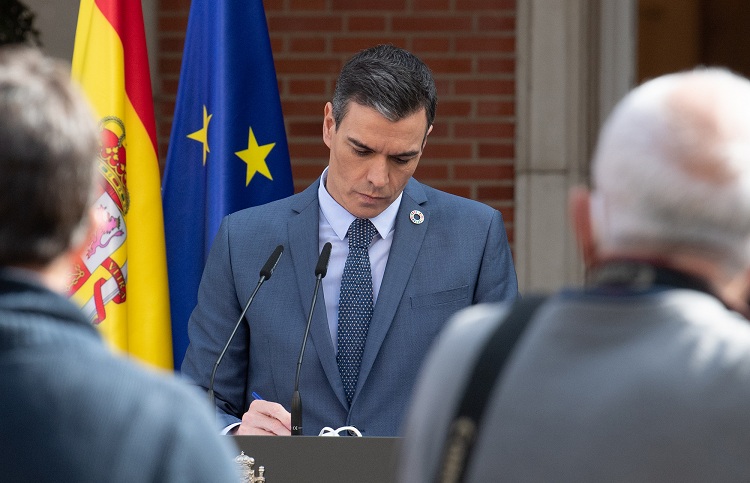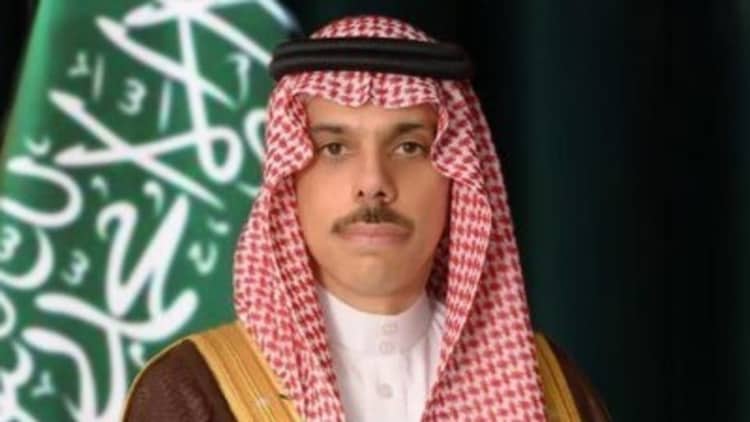The Diplomat
The Government turns to the European Union to try to reverse Algeria’s double decision to suspend the Friendship Treaty and to freeze trade relations with Spain, measures that have been rejected by the European Commission itself and that could even violate the agreements between Algiers and Brussels. Pending developments, the Executive continues with its usual conciliatory tone for these cases, while both the opposition and the formations most sympathetic to Pedro Sanchez (except the PSOE) accuse the President of not having known how to calculate the consequences of his unexpected change of course with regard to Western Sahara.
The national and territorial conflicts in the Maghreb have once again blown up in the face of the President of the Government, Pedro Sánchez. The problems began in the spring of last year, with the clandestine and irregular entry into Spain of the leader of the Polisario Front, Brahim Ghali, which led to a very serious diplomatic crisis with Morocco and served as an excuse for Rabat to increase pressure on Madrid to modify its policy towards Western Sahara. Sanchez’s solution came on March 18, when, in a letter sent to King Mohammed VI, he officially declared that the Moroccan proposal for autonomy for Western Sahara is “the most serious, credible and realistic basis for the resolution of this dispute”.
That radical change of course in Spanish foreign policy made it possible to overcome the bilateral diplomatic crisis with Morocco, but at the price of ruining good relations with Algeria, the main supplier of gas to Spain – a not irrelevant fact in the current energy crisis caused by the war in Ukraine – which has resulted, to date, in the recall for consultations of the ambassador of Morocco’s ambassador to Spain, This has resulted, to date, in the recall for consultations of the Algerian ambassador in Madrid and in the double decision of Algeria, announced this Wednesday, to suspend the Treaty of Friendship, Good Neighborliness and Cooperation with Spain and to freeze, through the Algerian Professional Association of Banks and Financial Establishments (ABEF), the direct debits related to foreign trade operations of products and services to and from Spain.
In his usual conciliatory line, the Minister of Foreign Affairs, José Manuel Albares, assured the press yesterday that they were analyzing “exactly the implications of this measure, the practical scope, both at national and European level”, in order to give an “adequate, serene and constructive response, but also firm in the defense of the interests of Spain and of Spanish companies”. Likewise, and as is also usual for him, he shielded himself in “discretion” in order not to clarify if there had already been contacts with the Algerian authorities and reiterated Spain’s desire to “have the best relations with Algeria”. Regarding the possible effect on energy supply from Algeria, he assured that “the flow of gas follows the usual line and has, at this moment, no inconvenience”.
Government sources informed the media that the “calm and constructive” response of the Executive could involve the EU, specifically the possibility of denouncing Algeria before Brussels for non-compliance with the 2005 Association Agreement regarding the North African country’s decision to freeze commercial operations. According to that agreement, Algeria cannot discriminate against any EU member state in this matter. Brussels does not have common competences in foreign policy, but it does have the power to negotiate trade agreements with third countries and to protect the interests of the Member States in this area (as happened with the decision of the then US President Donald Trump to raise tariffs on Spanish black olives).
Precisely, the spokesman for the European Commission, Eric Mamer, declared yesterday in Brussels that “the Algerian decision to suspend the Friendship agreement with Spain is extremely worrying” and, therefore, urged Algeria to “review its decision”. “We are studying the impact of the decision and pursuing diplomatic channels and working with Spain to find a solution,” he added. For her part, EU foreign affairs spokeswoman Nabila Massrali urged Algeria, “an important partner of the EU in the Mediterranean and a key player in regional stability,” to “review its decision” and to work “with Spain to overcome the current disagreements.”
For the time being, Albares will travel today to Brussels to meet with the Vice-President of the Commission for EU trade policy, Valdis Dombrovskis, which will force him to cancel his trip to Los Angeles to participate in the Summit of the Americas at the invitation of the United States, according to diplomatic sources informed the Europa Press agency. In his place, the Secretary of State for International Cooperation, Pilar Cancela, will attend.
Marlaska denies any link with the new arrival of small boats
On the other hand, the rest of the Government (except its president, who did not even mention Algeria during his appearance on Wednesday in Congress to address the new policy towards Morocco) maintained yesterday a position similar to that of Albares.
The Government spokeswoman, Isabel Rodríguez, insisted that Moncloa’s wish is to “re-establish relations with the neighboring country and bring them back on track as soon as possible”; the Minister of Finance, María Jesús Montero, assured that the current contracts between the Algerian company Sonatrach and Spanish companies for the supply of Algerian gas are still in force and “it will continue to be provided, as it has been done during this time”; and the Minister of the Presidency, Félix Bolaños, declared that the Treaty of Friendship has not been broken, but has been suspended, and, therefore, Algeria’s decision is not “definitive” and there is still time to reestablish this treaty “as soon as possible” in order to “have a normalized and loyal relationship”.
For his part, the Minister of the Interior, Fernando Grande-Marlaska, assured that Algeria is a “relevant and important partner” and ruled out that the suspension of the Treaty will affect the current areas of cooperation, while rejecting that the arrival, yesterday, of several small boats with 113 migrants from Algeria to the Balearic Islands is related to this diplomatic crisis. Likewise, the third vice-president for Ecological Transition, Teresa Ribera, assured that “the companies that contract gas from Algeria are operating normally”. However, Ribera adopted a slightly more forceful tone by announcing that, should Algeria’s decisions affect gas supplies, Spain would go to court and to international arbitration mechanisms.
Opposition and partners in government and investiture
As was foreseeable, the opposition took advantage of this new diplomatic setback to attack the Government. The leader of the PP, Alberto Núñez Feijóo, yesterday asked Algeria to know how to distinguish between the Government and the Spanish people and that, therefore, it should not be the citizens who pay “the effects of an improvised international policy”. “President Pedro Sánchez promised results, and the first one has been the diplomatic crisis with a strategic ally such as Algeria,” he declared.
In a similar vein, the president of Vox, Santiago Abascal, declared that “the whims of a leader can never mark the foreign policy of a country”. For the time being, PP and Ciudadanos (who described the Government’s policy as “negligent and terrible”) have already requested the appearance of Albares and Ribera before Congress to give an account of Algeria’s reprisals against Spain and their consequences. The former Prime Minister José María Aznar, signatory of the Treaty with Algeria in 2003, yesterday described this new chapter of the diplomatic crisis with the North African country as “colossal ridiculousness”.
There was also criticism from within the Government, including its investiture partners. The second vice-president, Yolanda Díaz (of Unidas Podemos), declared that it is “clear” that the change of policy towards Western Sahara (which she herself has repeatedly opposed) has “consequences” and the spokesman of Unidas Podemos (minority partner in the coalition Government) in Congress, Pablo Echenique, warned that the “trigger” of this crisis is the change of course of the Executive regarding Western Sahara, although he expressed his confidence that both Albares and Sánchez can redirect this crisis in order to avoid dependence on liquefied gas from the United States. The PNV warned of the direct consequences of this crisis in the industry, the leader of Más País, Íñigo Errejón, attributed this situation to the “bandazo” (“sudden shift”) on Western Sahara, the spokesman of ERC, Gabriel Rufián, described as “frivolity” the “unilateral” decision of Sánchez on the former Spanish colony and Bildu asked the Government to “rectify” and recover the traditional position of Spain on this conflict.







